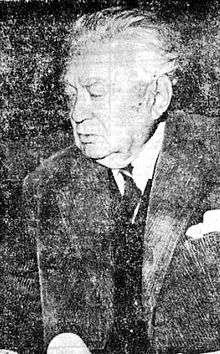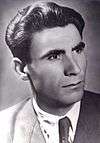List of heads of state of Yugoslavia
This article lists the heads of state of Yugoslavia from the creation of the Kingdom of Serbs, Croats and Slovenes (Kingdom of Yugoslavia) in 1918 until the breakup of the Socialist Federal Republic of Yugoslavia in 1992.
The Kingdom of Yugoslavia was a monarchy ruled by the House of Karađorđević from 1918 up until World War II. The SFR Yugoslavia was headed first by Ivan Ribar, the President of the Presidium of the People's Assembly (president of the parliament), and then by President Josip Broz Tito until his death in 1980, when the collective federal presidium rotated the presidency among the republic representatives. However, until 1990 the position of President of the League of Communists of Yugoslavia was usually the most powerful position (the position often coincided with the position of President). With the reforms in 1990, individual republics elected their own heads of state, but the country's head of state continued to rotate among appointed representatives of the republics until the country's dissolution.
Kingdom of Yugoslavia
| King of Yugoslavia | |
|---|---|
|
| |
|
| |
| Details | |
| Style | His Majesty |
| First monarch | Peter I |
| Last monarch | Peter II |
| Formation | 1 December 1918 |
| Abolition | 29 November 1945 |
| Residence | Royal Compound, Belgrade |
| Appointer | Hereditary |
| Pretender(s) | Crown Prince Alexander of Yugoslavia |
The Kingdom of Serbs, Croats and Slovenes was created by the unification of the Kingdom of Serbia (the Kingdom of Montenegro had united with Serbia five days previously, while the regions of Kosovo, Vojvodina and Vardar Macedonia were parts of Serbia prior to the unification) and the provisional State of Slovenes, Croats and Serbs (itself formed from territories of the former Austro-Hungarian Empire) on 1 December 1918.
Until 6 January 1929, the Kingdom of Serbs, Croats and Slovenes was a parliamentary monarchy. On that day, King Alexander I abolished the Vidovdan Constitution (adopted in 1921), prorogued the National Assembly and introduced a personal dictatorship (so-called 6 January Dictatorship). He renamed the country Kingdom of Yugoslavia on 3 October 1929, and continued to rule as a de facto absolute monarch until his assassination on 9 October 1934, during a state visit to France. After his assassination, parliamentary monarchy was put back in place.
The Kingdom of Yugoslavia was defeated and occupied on 17 April 1941 after the German invasion. The monarchy was formally abolished on 29 November 1945.
All monarchs were members of the House of Karađorđević. Peter I, previously King of Serbia (since 1903), was proclaimed King by representatives of South Slav states. The royal family continued through his son (Alexander I) and his grandson (Peter II).
| Name | Portrait | Birth | Marriages | Death | Succession right | Royal house | Note |
|---|---|---|---|---|---|---|---|
| Peter I 1 December 1918– 16 August 1921 |  | 29 June 1844 Belgrade son of Alexander Karađorđević, Prince of Serbia and Persida Nenadović | Princess Zorka of Montenegro 1883 5 children | 16 August 1921 Belgrade aged 77 | previously King of Serbia, proclaimed King by representatives of South Slav states | House of Karađorđević | Held the title "King of Serbs, Croats and Slovenes". Prince Alexander served as regent in his final years. |
| Alexander I 16 August 1921– 9 October 1934 |  | 16 December 1888 Cetinje son of Peter I and Princess Zorka of Montenegro | Maria of Yugoslavia 8 June 1922 3 children | 9 October 1934 Marseilles aged 45 | son of the preceding | House of Karađorđević | Changed title to "King of Yugoslavia" in 1929. Assassinated in Marseilles. |
| Paul 9 October 1934– 27 March 1941 |  | 27 April 1893 Saint Petersburg son of Prince Arsen of Yugoslavia and Aurora Pavlovna Demidova | Olga of Greece and Denmark 22 October 1923 3 children | 14 September 1976 Paris aged 83 | cousin of the preceding | House of Karađorđević | Prince Regent for Peter II. |
| Peter II 9 October 1934– 29 November 1945 |  | 6 September 1923 Belgrade son of Alexander I and Maria of Yugoslavia | Alexandra of Greece and Denmark 20 March 1944 1 child | 3 November 1970 Denver aged 47 | son of the preceding | House of Karađorđević | Prince Paul acted as regent until ousted on 27 March 1941; exiled on 17 April 1941 and deposed on 29 November 1945. |
SFR Yugoslavia
| President of Yugoslavia | |
|---|---|
|
| |
| Formation | 29 December 1945 |
| First holder | Ivan Ribar |
| Final holder | Stjepan Mesić |
| Abolished | 5 December 1991 |
| Succession |
|
After the German invasion and fragmentation of the Kingdom of Yugoslavia, partisans formed the Anti-Fascist Council for the National Liberation of Yugoslavia (AVNOJ) in 1942. On 29 November 1943 a AVNOJ conference proclaimed the Democratic Federal Yugoslavia, while negotiations with the royal government in exile continued. After the liberation of Belgrade on 20 October 1944, the Communist-led government on 29 November 1945 declared King Peter II deposed and proclaimed the Federal People's Republic of Yugoslavia.
From 1945 to 1953, the President of the Presidium of the National Assembly was the office of the Yugoslav head of state. The post was held by Ivan Ribar.
From 1953 to 1963, Josip Broz Tito simultaneously held the offices of the President of the Republic (head of state) and the President of the Federal Executive Council (head of government). In 1963, the new Constitution renamed the state as Socialist Federal Republic of Yugoslavia, and divided the office of the President of the Republic from the Presidency of the Federal Council, even if the President of the Republic retained the power to preside over the Government when it met, on the French model.[1]
In 1974, the new Constitution provided for a collective federal presidency, consisting of representatives of the six republics, the two autonomous provinces within Serbia and (until 1988) the President of the League of Communists, with a Chairman in rotation. Notwithstanding, this constitutional provision was suspended because Tito was declared President for Life, thus chaired the collective presidency on a permanent basis. After his death in 1980, one member was annually elected President of the Presidency and acted as head of state.
League of Communists of Yugoslavia Socialist Party of Serbia Croatian Democratic Union Democratic Party of Socialists of Montenegro
| No. | Head of State | Lifespan | Took office | Left office | Party | Representing | Note | ||
|---|---|---|---|---|---|---|---|---|---|
| President of the Presidium of the National Assembly 1945–1953 | |||||||||
| N/A |  |
Ivan Ribar | 1881–1968 | 29 December 1945 | 14 January 1953 | Communist Party of Yugoslavia (party renamed) |
N/A | The office of the President of the Presidium of the Yugoslav National Assembly (the Parliament) was the office of the head of state 1945–1953. The Communist Party of Yugoslavia was reorganized and renamed into the League of Communists of Yugoslavia on November 2, 1952. | |
| League of Communists of Yugoslavia (party renamed) | |||||||||
| President 1953–1980 | |||||||||
| 1 |  | Josip Broz Tito | 1892–1980 | 14 January 1953 | 4 May 1980 | League of Communists of Yugoslavia | N/A | Office of the President of Yugoslavia instituted in 1953. Josip Broz Tito declared president for life in 1974. Office of President of the Presidency instituted to take effect upon Broz's death. | |
| Presidents of the Presidency 1980–1992 | |||||||||
| 1 |  | Lazar Koliševski | 1914–2000 | 4 May 1980 | 15 May 1980 | League of Communists of Yugoslavia | Macedonia | Chairman of the collective head of state. Succeeded Broz after his death as the then sitting Vice President of the Presidency. | |
| 2 |  | Cvijetin Mijatović | 1913–1993 | 15 May 1980 | 15 May 1981 | League of Communists of Yugoslavia | Bosnia and Herzegovina | Chairman of the collective head of state. | |
| 3 |  | Sergej Kraigher | 1914–2001 | 15 May 1981 | 15 May 1982 | League of Communists of Yugoslavia | Slovenia | Chairman of the collective head of state. | |
| 4 |  | Petar Stambolić | 1912–2007 | 15 May 1982 | 15 May 1983 | League of Communists of Yugoslavia | Serbia | Chairman of the collective head of state. | |
| 5 |  | Mika Špiljak | 1916–2007 | 15 May 1983 | 15 May 1984 | League of Communists of Yugoslavia | Croatia | Chairman of the collective head of state. | |
| 6 |  | Veselin Đuranović | 1925–1997 | 15 May 1984 | 15 May 1985 | League of Communists of Yugoslavia | Montenegro | Chairman of the collective head of state. | |
| 7 |  | Radovan Vlajković | 1922–2001 | 15 May 1985 | 15 May 1986 | League of Communists of Yugoslavia | SAP Vojvodina | Chairman of the collective head of state. | |
| 8 |  | Sinan Hasani | 1922–2010 | 15 May 1986 | 15 May 1987 | League of Communists of Yugoslavia | SAP Kosovo | Chairman of the collective head of state. | |
| 9 |  | Lazar Mojsov | 1920–2011 | 15 May 1987 | 15 May 1988 | League of Communists of Yugoslavia | Macedonia | Chairman of the collective head of state. | |
| 10 |  | Raif Dizdarević | 1926– | 15 May 1988 | 15 May 1989 | League of Communists of Yugoslavia | Bosnia and Herzegovina | Chairman of the collective head of state. | |
| 11 |  | Janez Drnovšek | 1950–2008 | 15 May 1989 | 15 May 1990 | League of Communists of Yugoslavia | Slovenia | Chairman of the collective head of state. | |
| 12 |  |
Borisav Jović | 1928– | 15 May 1990 | 15 May 1991 | League of Communists of Yugoslavia (until January 1990) | Serbia | Chairman of the collective head of state. League of Communists of Yugoslavia dissolved into six separate parties. In Serbia the party was succeeded by the Socialist Party of Serbia. | |
| Socialist Party of Serbia (from January 1990) | |||||||||
| N/A |  | Sejdo Bajramović (acting) | 1927–1993 | 16 May 1991 | 30 June 1991 | Socialist Party of Serbia | AP Kosovo | Acting president. | |
| 13 |  | Stjepan Mesić | 1934– | 30 June 1991 | 5 December 1991 | Croatian Democratic Union | Croatia | Chairman of the collective head of state. Last President of Yugoslavia. | |
| N/A |  | Branko Kostić (acting) | 1939– | 5 December 1991 | 15 June 1992 | Democratic Party of Socialists of Montenegro | Montenegro | Acting president. Installed by Serbia and Montenegro. | |
See also
- List of Deputy Heads of State of Yugoslavia
- Prime Minister of Yugoslavia
- Presidency of Bosnia and Herzegovina
- President of Croatia
- President of Serbia and Montenegro
- President of the Republic of Macedonia
- President of Montenegro
- President of Serbia
- President of Slovenia
%2C_1920s_to_1937.svg.png)

